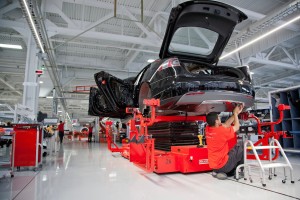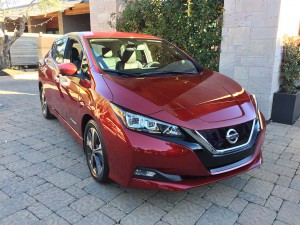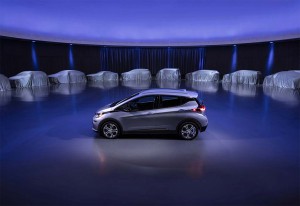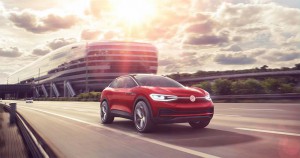
Tesla is quickly approaching the 200,000 vehicle limit that ends the $7,500 federal government tax incentive for EV buyers.
With a fourth assembly line now operating under a tent at its Fremont, California plant, Tesla is pressing hard to hit the weekly 5,000 Model 3 production target set earlier this year by CEO Elon Musk.
The good news for the battery-carmaker is that it appears to be close to that goal. The bad news is that with each new vehicle it sells in the U.S., Tesla also comes closer to reaching the threshold at which point it will see the phase-out of federal tax credits for its buyers.
The credits, totaling as much as $7,500 a vehicle, are set to begin phasing out when any individual manufacturer reaches U.S. sales of 200,000 qualifying plug-based cars, trucks or crossovers. Tesla is expected to reach that figure within a matter of weeks. And several other manufacturers, including General Motors, Nissan and Ford, are approaching that target, as well.
What happens then? “It does affect affordability,” said Stephanie Brinley, a senior analyst with IHS Automotive, especially on the first generation of relatively low-end battery-electric vehicles, such as the Model 3, Chevrolet Bolt and Nissan Leaf. But Brinley adds that the impact may not be immediate, as many of today’s buyers are “early adopters, less worried about pricing.
(GM increasing Bolt production, per sustainability report. Click Here for the story.)
That could change, she adds, as more conventional buyers start to consider going electric. All the more so, Brinley adds, “in 2020 or 2021, when you see a lot more competition” from you start to see lots more entries into the electric vehicle market from manufacturers who are either all-new to the segment or whose products have, until now, not been particularly competitive.
The incentives, first approved by the Bush Administration and expanded by the Obama White House, were intended to help level the playing field for green technology at a time when the cost of batteries was astronomical. In 2009, when the Nissan Leaf battery-electric vehicle and Chevrolet Volt plug-in hybrid debuted, a kilowatt-hour of lithium-ion batteries cost about $1,000. Today, it’s down to around $150.
The difference is huge: the 60 kWh in the Chevy Bolt BEV would’ve cost the factory $60,000 a decade ago. Today, it’s around $9,000. That said, prices need to drop by another two-thirds, industry planners estimate, to make electrics fully competitive with comparable gas-powered models.
The incentives actually have lasted longer than many had anticipated. Early on in his two terms, the former president expected to see U.S. sales of plug-based vehicles top 1.5 million by 2015. It didn’t come close, combined demand for plug-in hybrids and pure battery-electric vehicles barely nudging 200,000 by 2017. It is expected to reach 284,795 this year, according to a forecast by IHS Markit, and break into seven figures by early in the new decade, the research firm predicting demand of 1.125 million by 2022.

Nissan's second-generation Leaf was the company's only vehicle that enjoyed a sales increase last month.
As Brinley noted, there should be a flood of offerings available, several industry forecasts predicting that as many as 200 all-electric models, along with scores of plug-in hybrids, will be in dealer showrooms. GM alone has laid out plans for 20 BEVs by 2023 – though some may not be sold in the U.S.
After a slow start, battery prices are continuing to slide and the Boston Consulting Group predicts they will drop to $70 a kWh by 2022. That will still mean that manufacturers will have to choose between charging consumers a premium or taking a steep hit on margins.
That’s one reason a study released this month by Detroit’s AlixPartners warned that the industry could wind up losing tens of billions of dollars on electrification. That hit could be reduced by sharing the burden with taxpayers, of course.
(Click Here for more about the 1 in 4 Model 3 owners who have cancelled their reservations.)
Many observers were surprised to see the Republican-controlled Congress retain the current credits when the Trump-backed tax overhaul was passed last December. The question is whether a party dominated by those who question the concept of climate change and the need to support greener automotive technology might now be willing to take the next step and extend the tax credits.
“We’ve continually reinforced the need to extend,” GM CEO Mary Barra said this past month. Other manufacturers, notably including Tesla, have also been lobbying for an updated package that would, in particular, help automakers now approaching the limits.
Once a company’s sales break the 200,000 mark the incentives don’t vanish overnight. If Tesla were to cross the threshold in July buyers would continue to receive the full $7,500 through the end of the year. Then, for the first half of 2019 that would be cut in half, to $3,750. For the next two quarters, say July 1 through Dec. 31, 2019, Tesla buyers would receive just a quarter of the original credit, $1,850, before the automaker’s incentives would dry up.
That would likely occur just as Tesla was finally getting its production of the Model 3 in gear after a year of what CEO Elon Musk has dubbed “production hell” at the company’s Fremont, California assembly plant. GM’s credits, at the current sales pace for the Chevrolet Bolt might start drying up by mid-2019, just as it launches the next two of its all-electric models.
And that would be just as competitors such as Jaguar, Porsche and Audi drive into the plug-in segment for the first time, while other manufacturers, such as Ford and Volkswagen, finally debut long-range models that could make them competitive.
“The groundbreakers, the people who forged ahead and got these products out there first, could be at a significant disadvantage now,” Rebecca Lindland, executive analyst at Kelley Blue Book, told trade publication Automotive News this week. “I don’t think it’s fair to reward a company that hasn’t been as innovative with an incentive that begins when someone else’s ends.
(FCA planning to plug in. Click Here for the story.)
“We need to not penalize the companies that were innovative and early to market.”



Rebecca Lindland is ignorant – Tesla receives hundreds of millions of dollars from automakers who do noy produce electrics in the form of ZEV credits. Nor has Tesla “advanced a technology that others are taking advantage of? Tesla , in fact attempted to monopolize the charging business with their Superchargers, but the world’s automakers opted for a non-proprietary, open charging protocol that cannot be controlled by any manufacturer. Lindland obviously is NOT an automotive engineer – Tesla has developed nothing that any other automaker would want. It has no patents worth anything. As many have said : Tesla has no moat or any barrier to competition from other automakers. Tesla’s technology is also falling behind – CCS chargers are now twice as fast as Tesla Superchargers, and Tesla drivetrain cooling systems are grossly inferior, as in the lack of battery safety and their lethal misnamed “Autopilot.”